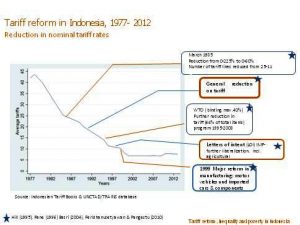 On 19 August 2016, BAPPENAS hosted the FKP Seminar in which Yessi Vadila (The Australian National University) presented her research on the socio-economic and environmental impacts of trade tariff reform in Indonesia. The research is divided into three main sections. The first section studies the impact of tariff reform on Indonesia’s inequality and poverty rate. The study employs nominal tariff, initial regional labor market structure data, and national input output table of 26 provinces from UNCTAD-TRAINS, IPUMS, and Statistics Indonesia. These data were later processed using panel regression technique. The second section studies the impact of tariff reform on child mortality rates. Using data on child mortality rate and tariff of 283 Indonesian districts in year 2007 from Indonesian Basic Health Survey and UNCTAD-TRAIN database, and analysis were then carried out using cross-section regression technique. The last section studies the impact of tariff reform on air pollution level. By employing data of 232 districts regarding tariff, aerosol index, initial regional labor market structure, input-output structure, and other controls from UNCTAD-TRAINS Database, IPUMS, 1990 Census, and Center for Climate Research, and regression with first difference and spatial specification was later executed.
On 19 August 2016, BAPPENAS hosted the FKP Seminar in which Yessi Vadila (The Australian National University) presented her research on the socio-economic and environmental impacts of trade tariff reform in Indonesia. The research is divided into three main sections. The first section studies the impact of tariff reform on Indonesia’s inequality and poverty rate. The study employs nominal tariff, initial regional labor market structure data, and national input output table of 26 provinces from UNCTAD-TRAINS, IPUMS, and Statistics Indonesia. These data were later processed using panel regression technique. The second section studies the impact of tariff reform on child mortality rates. Using data on child mortality rate and tariff of 283 Indonesian districts in year 2007 from Indonesian Basic Health Survey and UNCTAD-TRAIN database, and analysis were then carried out using cross-section regression technique. The last section studies the impact of tariff reform on air pollution level. By employing data of 232 districts regarding tariff, aerosol index, initial regional labor market structure, input-output structure, and other controls from UNCTAD-TRAINS Database, IPUMS, 1990 Census, and Center for Climate Research, and regression with first difference and spatial specification was later executed.
Several findings were generated from the study. First, regions that were more exposed to tariff reform experienced lower inequality measures and larger reductions in poverty rates. Second, the study also found that greater exposures to tariff reform were correlated with lower infant and under five mortality rates. On the other hand, districts with higher exposure to input tariff reductions were found to be having lower child mortality rates in 2007. Third, the study found that input tariff reduction contribute to a decrease in aerosol index, a result that is robust to any potential confounding and spatial dependence effects. In addition, reduction of input tariffs increases average industrial efficiency, promotes industrial export, and shifts industrial production to relatively more environment-friendly sectors.
The findings allow us to draw several important conclusions which may impact future trade policies. The study found that tariff reform has contributed to lower income inequality and poverty rates. Second, the study found that tariff reform has a contribution in lowering infant and under five mortality rates. Last, contrary to the pre-existing view that trade may deteriorate the environment, this study found that tariff reform, at least in Indonesia, has resulted in lower air pollution index.